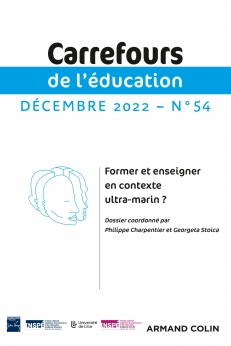
CARREFOURS DE L'ÉDUCATION N°54 (2/2022)
Pour acheter ce numéro, contactez-nous
Recevez les numéros de l'année en cours et accédez à l'intégralité des articles en ligne.
Les mentors ont souvent cette caractéristique d’être recrutés sur la base de qualités personnelles comme l’attention portée aux autres. Mais afin qu’ils soient plus efficients auprès des personnes aidées, des sessions de formation leur sont proposées. Le risque est alors de les voir plus ou moins perdre ces qualités, notamment lorsqu’ils ont pour mission de faire appliquer les programmes ou méthodes préconisées par les institutions qui les recrutent. Dans le but d’examiner ce point à caractère problématique, deux études menées aux États- Unis et une en Irlande sont analysées dans cet article. Elles ont trait à l’action d’enseignants expérimentés (les mentors) auprès d’enseignants débutants (les mentorés). Les premiers ont pour mission de faciliter l’entrée dans le métier des seconds. L’examen du jeu entre les aspects formels et informels de la formation des mentors fournit effectivement quelques enseignements sur la question étudiée. Cela dit, l’expérience anglo-saxonne en la matière est de nature à interroger (plus qu’à influencer) le regard qui peut être porté, ailleurs, sur les formations mentorales mises en oeuvre.
Mentors are often recruited on the basis of personal characteristics, such as interest in others. But in order for them to be more efficient with their mentees, they are given training sessions. The risk lies in seeing them, as a consequence, lose little by little their specific characteristics, especially when their mission is to promote the implementation of the programs or methods recommended by the institutions hiring their services. In order to study this problematic aspect of the functioning of mentors, we focus on two studies from the United States and Ireland. Both concern the activity of experienced teachers (mentors) regarding beginning teachers (mentees). The former have the mission of helping the latter into the profession. The study of the interaction between formal and informal aspects of mentor training does indeed offer some insights into the issue. Notwithstanding, the Anglo-Saxon aspect of this experience can lead to questioning – rather than influencing – the way other forms of mentor training can be analysed.